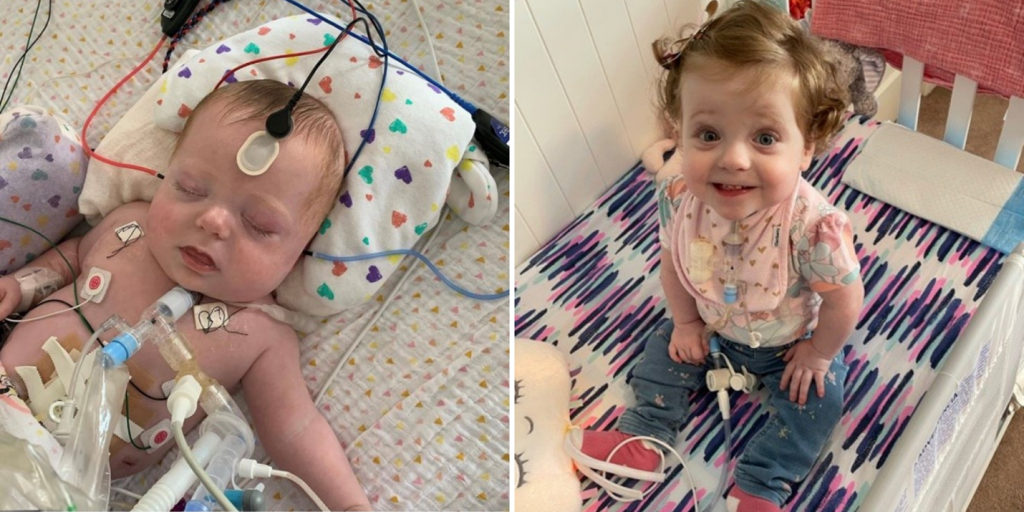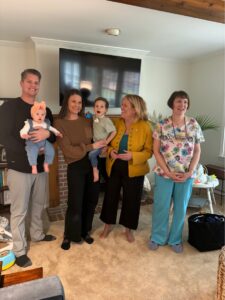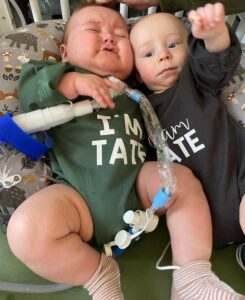Two Pennsylvania mothers share how more needs to be done to ensure all medically-complex families can stay together at home

Parents of medically-fragile children face so many challenges throughout their lives, and 15-month-old Leena Stull’s parents fear for the future: As medical technologies enable hundreds of thousands of individuals live better, longer, healthier lives, they also create new challenges that the healthcare world must address. As the mother of a baby that has graduated from Children’s Hospital of Philadelphia’s (CHOP) NICU with home care nursing, Alexis Stull is advocating for Leena—and for the many children like her that have yet to be born.
Leena was diagnosed with IUGR in the womb and was delivered at just 27 weeks, weighing less than two pounds. She was diagnosed with bronchopulmonary dysplasia, meaning that her lungs are not fully developed and that she will need special medical care and equipment for the foreseeable future. She was immediately put on oxygen and ventilator support and placed in York Hospital’s NICU for more than 3 months, awaiting transfer to CHOP. Once a bed opened for Leena in CHOP’s NICU, Leena was there for 9 weeks until she and her parents were able to get to the Progressive Care Unit (PCU), where they were to be intensively trained on how to care for Leena medically for the remaining 3 months of her stay. “Because they know it would be difficult for us to find enough in-home nurses, they trained us to stay up for 24 hours straight,” says Alexis.
“Because they know it would be difficult for us to find enough in-home nurses, they trained us to stay up for 24 hours straight,” says Alexis.
Alexis and husband Daryl were completely trained by mid-June, but were unable to take Leena home until proper nursing coverage was secured for her in her hometown of Chambersburg in Mid-August. It took nine weeks and three home health care agencies, plus CHOP’s case management team, to finally find a nurse that could care for Leena in her own home.
Now home for six months, Leena is thriving alongside her caring parents and their two dogs, Gabby and Meeko. But finding enough in-home nurses to cover the shifts that Leena needs remains a challenge. “Leena is authorized for 112 hours of skilled in-home care per week, and we can’t access even close to that much.” Currently, the Stulls are functioning with one available night nurse, and many of their nursing shifts aren’t covered. “We have four nurses and no back-ups if there is a call-out. On nights when [night nurse] Jess isn’t here, I will stay up to monitor Leena until 3am, when I will switch with Daryl and sleep until 5:30 before it’s time for me to wake up for work,” explains Alexis. “The lack of nurses puts Leena in danger, and it also affects our ability to provide for Leena as fully-functioning parents.”
“The lack of nurses puts Leena in danger, and it also affects our ability to provide for Leena as fully-functioning parents.”
Part of the reason there aren’t enough nurses to be in home care is because of the lower wages in home care, and the nature of the job. PA hospitals can offer higher wages for RNs and LPNs, which creates a recruitment and retention gap for providers like BAYADA that can only compete for a small portion of the nursing workforce. Additionally, medically-complex clients like Leena—who has a trach, vent, and feeding tube—require special skills and one-on-one care. Typically, such skills can allow a nurse to make more in wages at a skilled nursing facility. However, home care providers are limited by the state’s Medicaid funding formula, which does not reimburse additional funds for highly-trained nurses that can take on more difficult, higher acuity cases.”

Gemma was diagnosed with Esophageal atresia, Tracheomalacia, and Laryngeal cleft—among other diagnoses and complications—upon birth. This means that she cannot breathe or eat without special medical devices and skilled nursing care. This also means that she is medically authorized for 68 hours of skilled private duty nursing (PDN) care per week delivered by a pediatric nurse qualified to keep her safe and healthy at home.
But accessing that care is another major challenge that Gemma and her family are working to overcome. Though they are entitled to daily in-home nursing, they can’t access the hours that Gemma’s doctor has prescribed. “Right now, we only receive nursing three nights a week—which leaves us without any help four nights a week, and every day,” says mom Janelle. Currently, she and her husband take turns sleeping while juggling work and other duties so that they can make sure Gemma is safe through the night and can receive her feedings and regular treatments during the day. Without properly staffed nursing in place, Janelle and Derek struggle to work, sleep, and take care of their home and other children.
Where are the Nurses? Thousands of families across Pennsylvania and the US struggle to receive the in-home nursing care they are prescribed and authorized for. Nurses are attracted to hospitals, nursing homes, and other facilities where they can earn more in wages. Home care providers who staff pediatric clients like Gemma cannot recruit and retain enough nurses to fill the need. “We have to turn down many cases because we no longer have enough nurses on staff,” says BAYADA office director Marian Lehman.
“When we can’t staff cases, babies end up staying in the NICU longer, and parents have to go without care—which often results in preventable trips to the ER.”
In order to be able to compete with hospitals and facilities, the state must raise private duty nursing (PDN) program rates so that nurses are attracted to in-home nursing. Pennsylvania last increased funding for the PDN program in 2017. Since then, costs of living and doing business have gone up, especially due to COVID. “The state’s PDN rates must cover the nurse’s wage, plus training, benefits, and supplies—which now include masks, gloves, gowns, and more. COVID has increased the need for nurses, but has devastated our ability to pay them fairly and stay sustainable,” says Marian.
Janelle and Derek have no doubt that Gemma is safer and healthier at home and out of the hospital, especially now, as facility settings are especially infectious during the COVID pandemic. “Keeping Gemma safe is our number 1 priority… everything else is on the back burner,” says Janelle. “But this is no way for us and for other medically-complex families to live.”
“We need to be able to access home nursing so that we can continue to care for our home, our other children, and continue to provide for our family... We aren’t meant to be nurses, we are meant to be parents.”

Gemma was diagnosed with Esophageal atresia, Tracheomalacia, and Laryngeal cleft—among other diagnoses and complications—upon birth. This means that she cannot breathe or eat without special medical devices and skilled nursing care. This also means that she is medically authorized for 68 hours of skilled private duty nursing (PDN) care per week delivered by a pediatric nurse qualified to keep her safe and healthy at home.
But accessing that care is another major challenge that Gemma and her family are working to overcome. Though they are entitled to daily in-home nursing, they can’t access the hours that Gemma’s doctor has prescribed. “Right now, we only receive nursing three nights a week—which leaves us without any help four nights a week, and every day,” says mom Janelle. Currently, she and her husband take turns sleeping while juggling work and other duties so that they can make sure Gemma is safe through the night and can receive her feedings and regular treatments during the day. Without properly staffed nursing in place, Janelle and Derek struggle to work, sleep, and take care of their home and other children.
Where are the Nurses? Thousands of families across Pennsylvania and the US struggle to receive the in-home nursing care they are prescribed and authorized for. Nurses are attracted to hospitals, nursing homes, and other facilities where they can earn more in wages. Home care providers who staff pediatric clients like Gemma cannot recruit and retain enough nurses to fill the need. “We have to turn down many cases because we no longer have enough nurses on staff,” says BAYADA office director Marian Lehman.
“When we can’t staff cases, babies end up staying in the NICU longer, and parents have to go without care—which often results in preventable trips to the ER.”
In order to be able to compete with hospitals and facilities, the state must raise private duty nursing (PDN) program rates so that nurses are attracted to in-home nursing. Pennsylvania last increased funding for the PDN program in 2017. Since then, costs of living and doing business have gone up, especially due to COVID. “The state’s PDN rates must cover the nurse’s wage, plus training, benefits, and supplies—which now include masks, gloves, gowns, and more. COVID has increased the need for nurses, but has devastated our ability to pay them fairly and stay sustainable,” says Marian.
Janelle and Derek have no doubt that Gemma is safer and healthier at home and out of the hospital, especially now, as facility settings are especially infectious during the COVID pandemic. “Keeping Gemma safe is our number 1 priority… everything else is on the back burner,” says Janelle. “But this is no way for us and for other medically-complex families to live.”
“We need to be able to access home nursing so that we can continue to care for our home, our other children, and continue to provide for our family... We aren’t meant to be nurses, we are meant to be parents.”







